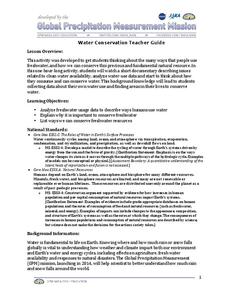Earth Day Network
Conserving Water Through Art!
Having fresh, clean drinking water is a privilege many people take for granted. Help raise awareness about the scarcity of water and the importance of conservation by discussing different ways water is used in everyday life. Brainstorm...
Curated OER
Water Conservation
Open learners' eyes to the challenge of finding safe drinking water – something we often take for granted in our country. The PowerPoint presentation includes images, graphs, diagrams, and even a video to stimulate discussion on how we...
Teach Engineering
Energy Efficiency
Using the resource is probably the most efficient way to learn about efficiency. The 18th installment of a 25-part Energy Systems and Solutions unit has pupils investigate energy efficiency through discussions and associated activities....
Teach Engineering
Household Energy Conservation and Efficiency
Are your household devices eating up a lot of energy? Pupils investigate household energy efficiency through a set of activities. They find ways to improve energy efficiency and reduce consumption. This is the 21st installment of a...
Aquarium of the Pacific
Kelp Forest Conservation
There otter be a better way. As a class, groups work together to create a food web based on the organisms in the kelp forest. Budding scientists watch a video on the kelp forest to see how the organisms create a food web and hear about...
Polar Bears International
Taking Action!
Motivate young scientists to stand up and take action with this environmental science instructional activity. To begin, the class works in small groups brainstorming actions that support the conservation of the earth before creating and...
Environmental Protection Agency (EPA)
Teachers' Guide to Using A Day In the Life of a Drop
Hydrology hopefuls learn about their local watershed. Through discussion and online interactives, they see that their habits affect the water supply. The lesson concludes with a pledge to filter out bad water usage habits. It makes a...
Curated OER
Roller Coasters
Twisting and turning through the sky, roller coasters are popular attractions at amusement parks around the world, but how exactly do they work? Explore the physics behind these thrilling rides with an engineering design activity....
Sargent Art
Protect Our Marine Life
Encourage water conservation and boost art skills with a hands-on activity that challenges young painters to create a scene highlighting marine life. Using oil pastels, scholars draw an underwater scene and write a tip for viewers to...
National Park Service
What Can We Do?
Motivate young conservationists to stand up and make a change. After learning about the efforts in Cascade Nation Park to reduce carbon emissions in order to preserve the wilderness, learners work in groups creating action plans for...
Science 4 Inquiry
Maintaining Mass
Can you disprove the law of conservation of mass? Pupils observe the teacher weigh each part of a reaction. Then, the teacher weighs the result of the reaction and everyone sees that the products do not equal the reactants. Then they...
Kenan Fellows
Sensors in Chemistry
The Environmental Protection Agency monitors sensors to track air pollution and set clean air standards. Enthusiastic young scientists use similar sensors to gather data in their area and then apply the gas laws and conservation of...
Teach Engineering
Pushing it Off a Cliff
Focus on the conservation of energy, specifically looking at gravitational potential energy and kinetic energy, with a lecture that involves having friends throw light objects at each other to determine which has more kinetic energy and...
Teach Engineering
It's Tiggerific!
Spring into elastic potential energy with a lesson that provides background information on determining the elastic potential energy of springs and other elastic materials. General energy equations emphasize the conservation of energy and...
Teach Engineering
Exploring Energy: Energy Conversion
The energy is not really lost, it is just converted to a different form. Pupils learn about the conversion of energy in the fifth segment of an energy unit with six parts. Learners develop an understanding of the conservation of energy...
Berkshire Museum
Where’s the Water?: Acting Out Science Cycles
Young scientists transform themselves into rivers, oceans, clouds, and drops of water in order to explore the water cycle. After assigning and explaining to learners their different roles in the activity, the teacher reads aloud a...
Messenger Education
Give Me a Boost—How Gravity Assists Aid Space Exploration
The propellant needed for space explorations runs in the thousands, while paying to get the craft into orbit costs millions! In the second installment of three, two activities explore laws of conservation of energy and momentum. Using...
Teach Engineering
The Energy Problem
Think you can solve the energy problem? You'll first need to know about current energy use. Analyzing a set of circle graphs lets scholars see where energy consumption is the greatest, both by sector and by household use. They develop a...
May Media Group
Treatment Plants
Young scientists explore nature's water treatment plants in this simple science demonstration. By placing a stalk of celery in a cup of water mixed with food coloring, children are able to observe how plants absorb nutrients and...
American Forest Foundation
Who Speaks for the Trees?
Help young conservationists appreciate the important role that trees play in ecosystems around the world with this collection of six engaging activities. From a shared reading and class discussion of Dr. Seuss' The Lorax, to in an depth...
American Chemical Society
Chemical Reactions and Engineering Design
Construction leads to habitat loss and local wildlife suffers. Scholars must build a reptile egg incubation device that meets many constraints. Various experiments help them discover the chemical reaction needed to reach the proper...
British Council
A New Logo for the World Wildlife Fund
Where does the money go? Learners take a look at the logo for the World Wildlife Fund and discuss characteristics of the panda in the logo. Scholars learn that cute, fuzzy endangered animals often receive the most donations. They keep...
NOAA
Sustaining Our Ocean Resources
Lead young scientists on an investigation of fishery practices with the final installment of this four-part unit. Using a PowerPoint presentation and hands-on simulation, this instructional activity engages children in learning how fish...
Aquarium of the Pacific
Sensational Sharks
Pray that you are not the prey of sharks! The class watches a video and a webcam on sharks and make observations about the different types of sharks. Learners compare two sharks and list their similarities and differences. They then...
Other popular searches
- Wildlife Conservation
- Water Conservation
- Marine Conservation
- Conservation Issues
- Conservation of Mass
- Conservation of Energy
- Conservation of Matter
- Energy Conservation
- Conservation of Momentum
- Law of Conservation of Energy
- Soil Conservation
- Law of Conservation of Mass

























